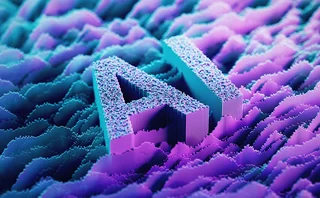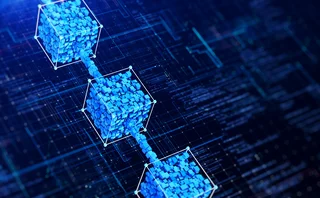AI a Go
The Google-developed AI program AlphaGo mastered what was considered to be the toughest board game for AI to crack, Go.

In October, a major breakthrough occurred in the world of artificial intelligence ─ a computer bested a human in the 2,500-year-old Chinese board game, Go. The findings from that contest were released this week in the scientific journal Nature.
Google researchers in England developed the program ─ AlphaGo ─ and pitted it against European Go champion Fan Hui. They played five formal games (which have longer time controls) and five informal games (which have shorter time controls). AlphaGo won the formal game 5-0, and bested Hui in the informal games 3-2.
This is a breakthrough because Go is considered incredibly complex. While a game like chess features on average 20 possible moves, Go has about 200. "The game of Go has long been viewed as the most challenging of classic games for artificial intelligence owing to its enormous search space and the difficulty of evaluating board positions and moves," according to the research paper.
The researchers used value networks to evaluate board positions and policy networks to select moves; Monte Carlo tree search programs that simulate thousands of random games of self-play; and they introduced a new search algorithm that combines Monte Carlo simulation with value and policy networks.
While computers have dominated in games like chess, checkers and othello, researchers thought that they were still "at least a decade away" from beating the full-sized, formal game of Go. Perhaps what was most impressive was that AlphaGo "intelligently" used its computations. Rather than simply running simulations on a massive amount of possible position moves ─ the way that IBM's supercomputer Deep Blue defeated chess grandmaster Garry Kasparov ─ it was able to cut down on the number of positions to a handful of "intelligent" moves.
From the report:
During the match against Fan Hui, AlphaGo evaluated thousands of times fewer positions than Deep Blue did in its chess match against Kasparov; compensating by selecting those positions more intelligently, using the policy network, and evaluating them more precisely, using the value network-an approach that is perhaps closer to how humans play. Furthermore, while Deep Blue relied on a handcrafted evaluation function, the neural networks of AlphaGo are trained directly from gameplay purely through general-purpose supervised and reinforcement learning methods.
The Week in AI
Earlier this year I wrote that for 2016, artificial intelligence (and the subset of machine learning) would be one of the three biggest areas of interest in the capital markets space.
Sure enough, just this week we had three stories looking at the area. Portware's Henri Waelbroeck talked about the ways that AI is proving most useful when it comes to institutional trading, and where there are still limits. ITRS CTO Justo Ruiz-Ferrer discussed how machine learning is helping the company to better understand customer needs. And analytics software provider Recognos Financial launched a machine learning data extraction service.
For the March issue of Waters I'm working on a feature looking at how machine learning is helping to develop very specific trading strategies. I'm happy to discuss more. Call me at 646-490-3973 or shoot me an email to anthony.malakian@incisivemedia.com.
But the point is that AI is rapidly growing. This will create new opportunities for firms, and it will also create new nightmares. The developers at Google thought they were a decade away from toppling Go...and then it was mastered.
The deep neural networks used by AlphaGo could prove to be revolutionary in helping traders to weed out the noise when it comes to analyzing trading data and movements. Maybe we're a decade away from a major breakthrough in the capital markets. Or maybe it's right around the corner.
But I'll bet one thing: if developers at a hedge fund crack the code, they won't go out publishing their results in Natrue magazine. In fact, we may never hear about it. Who knows...maybe the AI super-machine is already out there, besting investors.
Only users who have a paid subscription or are part of a corporate subscription are able to print or copy content.
To access these options, along with all other subscription benefits, please contact info@waterstechnology.com or view our subscription options here: https://subscriptions.waterstechnology.com/subscribe
You are currently unable to print this content. Please contact info@waterstechnology.com to find out more.
You are currently unable to copy this content. Please contact info@waterstechnology.com to find out more.
Copyright Infopro Digital Limited. All rights reserved.
As outlined in our terms and conditions, https://www.infopro-digital.com/terms-and-conditions/subscriptions/ (point 2.4), printing is limited to a single copy.
If you would like to purchase additional rights please email info@waterstechnology.com
Copyright Infopro Digital Limited. All rights reserved.
You may share this content using our article tools. As outlined in our terms and conditions, https://www.infopro-digital.com/terms-and-conditions/subscriptions/ (clause 2.4), an Authorised User may only make one copy of the materials for their own personal use. You must also comply with the restrictions in clause 2.5.
If you would like to purchase additional rights please email info@waterstechnology.com
More on Emerging Technologies
As trading firms embrace AI, so do hackers
According to a Google cybersecurity report, cybercriminals are turning to AI to sharpen their attacks.
AI & data enablement: A looming reality or pipe dream?
Waters Wrap: The promise of AI and agents is massive, and real-world success stories are trickling out. But Anthony notes that firms still need to be hyper-focused on getting the data foundation correct before adding layers.
Waters Wavelength Ep. 343: Broadridge’s Jason Birmingham
This week, Jason Birmingham of Broadridge talks with Tony about the importance of fundamentals as technology rapidly evolves.
Data standardization is the ‘trust accelerator’ for broader AI adoption
In this guest column, data product managers at Fitch Solutions explain AI’s impact on credit and investment risk management.
BNY inks AI deal with Google, Broadridge moves proxy voting to AWS, Expero delivers ICE market data, and more
The Waters Cooler: TSX Venture Exchange data hits the blockchain, SmartTrade acquires Kace, and garage doors link to cloud costs in this week’s news roundup.
Everyone wants to tokenize the assets. What about the data?
The IMD Wrap: With exchanges moving market data on-chain, Wei-Shen believes there’s a need to standardize licensing agreements.
Google, CME say they’ve proved cloud can support HFT—now what?
After demonstrating in September that ultra-low-latency trading can be facilitated in the cloud, the exchange and tech giant are hoping to see barriers to entry come down.
Waters Wavelength Ep. 342: LexisNexis Risk Solutions’ Sophie Lagouanelle
This week, Sophie Lagouanelle, chief product officer for financial crime compliance at LNRS, joins the podcast to discuss trends in the space moving into 2026.







